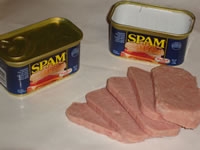October 13, 2006
spam will be spam
 The European Union has
rejected Hormel's attempt to claim Spam
as a trademark for unsolicited commercial email. Hormel is the manufacturer of Spam™, the
canned pork product, shipments of which by the United States were reportedly credited by Nikita Khruschev with feeding the Red Army
during the Second World War. Not surprisingly, Hormel takes Spam very seriously - they even have a
Spam Museum.
The European Union has
rejected Hormel's attempt to claim Spam
as a trademark for unsolicited commercial email. Hormel is the manufacturer of Spam™, the
canned pork product, shipments of which by the United States were reportedly credited by Nikita Khruschev with feeding the Red Army
during the Second World War. Not surprisingly, Hormel takes Spam very seriously - they even have a
Spam Museum.
Hormel's existing trademark is for canned meat products, but what Hormel has been unhappy with is the use of the word "Spam" in the names of anti-spam businesses such as SpamArrest, which is not covered by their trademark. They therefore attempted to acquire the trademark for Spam with the meaning of "unsolicited commercial electronic mail". The EU was correct in denying this application since spam in this sense is already a well established generic term and it would be unfair to allow Hormel to privatize it.
Trademark owners generally have one of two concerns. If someone selling a similar product is using a similar term, their concern is that they will lose sales to the other company, or, if the other company has a bad reputation, be tainted by association with it. That isn't a concern here: nobody is going to confuse an anti-spam service with canned ham. The other concern that they may have is that other uses of the term will "dilute" their trademark by moving it in the direction of a generic term. This isn't a real concern either: using the term spam in the name of an anti-spam service cannot have any effect on the genericity of the term for canned meat.
Hormel lets on to what their real concern is in this statement:
Ultimately, we are trying to avoid the day when the consuming public asks, 'Why would Hormel Foods name its product after junk e-mail?
They are correct in thinking that where spam once had no meaning other than their product it now has a second meaning that is probably more salient. Indeed, the EU decision, using a research technique they may have learned here on Language Log, provides evidence that this is already the case:
The European Office of Trade Marks and Designs, noting that the vast majority of the hits yielded by a Google search for the word made no reference to the food, said that "the most evident meaning of the term SPAM for the consumers ... will certainly be unsolicited, usually commercial e-mail, rather than a designation for canned spicy ham."
I don't know whether this will reduce their sales, but they are wrong to think that trademark law, or any linguistic legislation, can help them. Language changes and the world changes in ways that may adversely affect a business.
Posted by Bill Poser at October 13, 2006 01:49 AM